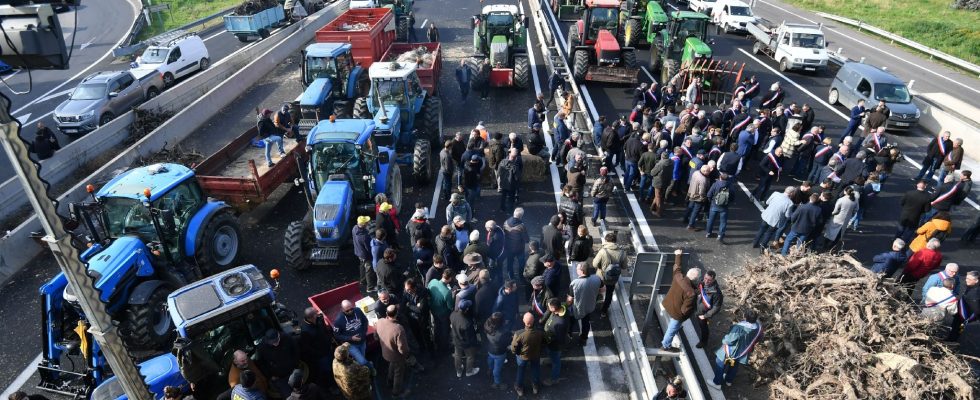The first responses from Brussels were eagerly awaited this week, as farmers’ discontent continues across Europe. This Wednesday, January 31, the European Commission offered the first guarantees to the agricultural world by proposing to grant a partial exemption from fallow obligations in the EU, as well as by ensuring to intervene to limit any uncontrollable increase in Ukrainian agricultural imports. . A way of letting go of two major demands crystallizing anger against the EU.
Since the exemption from customs duties granted in spring 2022 by the EU, the influx of Ukrainian agricultural products – cereals, eggs, chickens, sugar, etc. – has angered farmers. The latter accuse them of lowering prices on local markets and maintaining “unfair” competition by abstaining from certain European standards (pesticides, mass-raised poultry, etc.).
An “emergency brake” planned for Ukrainian imports
Brussels is certainly proposing to renew for an additional year, between June 2024 and June 2025, the exemption from customs duties granted to Ukraine since spring 2022 to support the country at war. But by combining it with reinforced “safeguard measures” limiting the impact of imports of Ukrainian agricultural products, which jumped by 11% in value over one year in January-September 2023. “We are sensitive to the concerns of States and the agricultural world […] Although our monitoring does not show any negative impact on the entire European market, we are aware of more localized effects,” acknowledged Commission Vice-President Margaritis Schinas.
According to the text submitted to States and MEPs, “rapid corrective measures” may be adopted in the event of “significant disturbances” on the market, even if they only concern one or several States. For “sensitive” products – poultry, eggs and sugar – an “emergency brake” is planned to “stabilize” imports at average volumes imported in 2022 and 2023, levels beyond which customs duties would be reimposed.
An arsenal of restrictions which will remain supervised by Brussels, contrary to the embargo imposed unilaterally in 2023 by neighboring states of Ukraine to the great dismay of the Commission, watchdog of trade policy. “These measures will make it possible to lift these illegal unilateral restrictions in Poland, Slovakia and Hungary,” responded Ukrainian Prime Minister Denis Chmygal, welcoming an extension of the customs exemption capable of “strengthening” the country’s precarious economy.
A “partial exemption” for fallow land
Another issue highlighted by agricultural discontent: the fallow obligations imposed by the new Common Agricultural Policy (CAP) which came into force at the start of 2023. To receive European aid, farmers must respect agro-environmental criteria, and in particular leave less than 4% of arable land fallow or non-productive areas (hedges, groves, ponds, etc.).
This fallow obligation was suspended entirely last year without conditions, to compensate for the disruptions in Ukrainian and Russian cereal supplies following the conflict. But for 2024, it would finally be subject to a “partial derogation”, according to the proposal submitted to the Twenty-Seven for rapid adoption. Farmers will be able to benefit from CAP aid even if they do not have 4% fallow land, provided however that they reach 7% of intermediate or nitrogen-fixing crops (lentils, peas, etc.) without using any products. phytosanitary products.
Brussels initially refused to renew the exemption this year, despite the insistent appeal of a majority of states including France. “With the stacking of factors – weather disasters, geopolitical tensions, high energy prices – we are obliged to act to ease the pressure” while seeking “how to protect our biodiversity and soils”, commented the Commissioner in in charge of the Green Deal, Maros Sefcovic.
A welcomed response
“Finally! Faced with climatic and geopolitical disruptions, the lack of availability of cereals is recognized”, in time for sowing, greeted Christiane Lambert, president of Copa-Cogeca, the organization of the majority European agricultural unions. French Minister of Agriculture Marc Fesneau welcomed “a simple and pragmatic solution which combines transition and production”.
“Important first step […] Fewer administrative burdens, often imposed by Europe. And a fair price for the hard work” of farmers, adds Belgian Prime Minister Alexander De Croo. His country is experiencing major mobilizations of farmers who will be invited to Brussels on Thursday on the sidelines of a summit of the Twenty-Seven, then that many other areas of discontent are brewing across Europe: trade agreements like Mercosur, disparate ecological standards depending on the Member States, etc.
